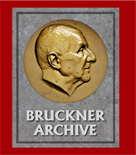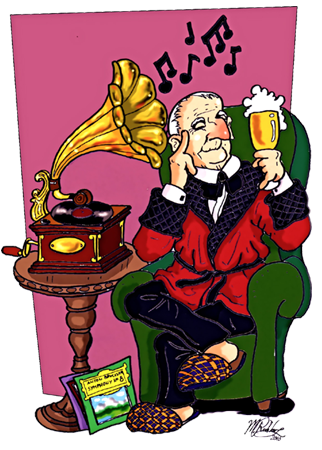For Bruckner's birthday: An instrumental arrangement of Ecce sacerdos magnus, WAB 13
Yesterday as I was scanning YouTube for Bruckner-related items, I came across a work entitled, "Hymn of Praise" by Anton Bruckner, arr. Gordon. The performance was by the National Youth Band of Canada. I did some asking around and William Carragan provided the following information: "It is the motet Ecce sacerdos magnus, WAB 13, " Behold a great priest", a responsory or processional antiphon used for the reception of a bishop. It is originally written for mixed chorus and brasses. Its grand style reminds us of the late symphonies, consistent with its date of 1885. When the trumpets play alone you can hear the rhythm of the words of the repetendum, Ideo jurejurando fecit illum Dominus crescere in plebem suam. The full text, translated, is: Behold a great priest, who in his days pleased God. Therefore, by an oath, the Lord made him increase among his people. He gave him the blessing of all nations, and confirmed his covenant upon his head. It's based on words from Ecclesiasticus 45." The video can be seen HERE Some information about the arranger: Philip Gordon (1894-1983) was a composer, arranger, conductor, and music educator. Born in Newark, New Jersey, Gordon began his music training with violin lessons at age six. His later teachers included James Efross (violin) and Mandel Svet (violin, piano, and harmony). Gordon received bachelor, master, and doctoral degrees from Columbia University, where he studied English Literature and Germanic Languages. His master's thesis was on German Singspiel, and his dissertation, completed in 1950, was titled "Contemporary Music for Performing Groups." In the 1950s, Gordon married author and educator Julia Weber, and the couple settled in Princeton. Gordon served as director of the orchestra department of the Master Institute of the Roerich Museum in New York, and as conductor of the Bach Cantata Society in New York, the YM-YWHA Symphony in Newark, and the Newark Civic Symphony. In cooperation with the Works Progress Administration (WPA), Gordon organized several orchestras and bands, which performed concerts in parks, schools, community centers, hospitals, and other public institutions. As a composer, Gordon strove to balance the experimental ideas and techniques of the 20th century with more traditional compositional techniques. He also believed in the importance of hearing one's own compositions performed. Accordingly, he often created works for particular groups to perform at specific occasions. Gordon also focused on composing high-caliber music for young students, composing for the groups under his direction while a music teacher at South Side High School in Newark. In 1952, he created "Funday Songs," a radio show which was broadcast three times a week into Newark classrooms. These 15-minute radio scripts were comprised of several songs composed by Gordon, with lyrics by Ilo Orleans. In addition to his conducting and composing, Gordon was involved with several state and national music education organizations. He was director of the music department of the New Jersey Educator's Association, president of the New Jersey Music Educators Association, national vice-chairman of the Music Educators National Conference (MENC) Committee on Contemporary Music, and charter member, composer-in-residence, and executive board member of the New Jersey American String Teachers Association (ASTA) Summer String Conference. While at South Side High School, Gordon taught orchestra, chorus, harmony, music appreciation, and music fundamentals. He was also on the faculties of Chicago Musical College, Westminster Choir College, and Seton Hall University. | ||||||







